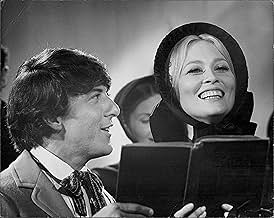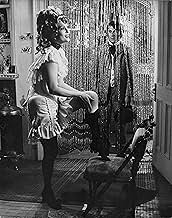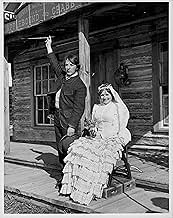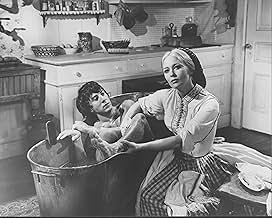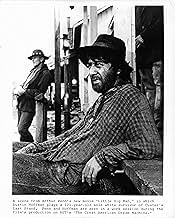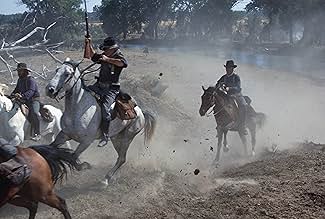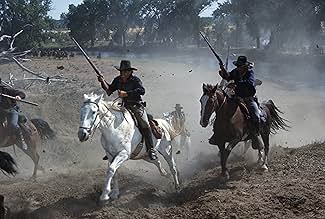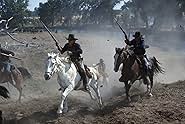Jack Crabb, olhando para trás, da mais extrema velhice, conta como foi criado por nativos americanos e lutou com o General Custer.Jack Crabb, olhando para trás, da mais extrema velhice, conta como foi criado por nativos americanos e lutou com o General Custer.Jack Crabb, olhando para trás, da mais extrema velhice, conta como foi criado por nativos americanos e lutou com o General Custer.
- Direção
- Roteiristas
- Artistas
- Indicado a 1 Oscar
- 5 vitórias e 11 indicações no total
- Sunshine
- (as Amy Eccles)
- Caroline
- (as Carol Androsky)
- Lieutenant
- (as Jess Vint)
- Direção
- Roteiristas
- Elenco e equipe completos
- Produção, bilheteria e muito mais no IMDbPro
Avaliações em destaque
Poor Hoffman just can't find himself a niche in the world of the west either with white men or with Indians. He finds himself in the Dakota Territory of the 1870s and makes the acquaintance of such people as Wild Bill Hickok and George Armstrong Custer, a couple of old west legends who met famous premature deaths in the same year of 1876. And of course some lesser people in mostly low places.
Hoffman gets some great support from people like Martin Balsam as a medicine show conman whom he spends some time with and Faye Dunaway as the widow woman who takes the orphan Hoffman in and explains and demonstrates the facts of life. Jeff Corey plays Wild Bill Hickok who explains to Hoffman he really doesn't have the right stuff to be a gunfighter.
Best of all is Richard Mulligan as the controversial General George Armstrong Custer whose ambitions for military glory led to the massacre at Little Big Horn. Mulligan is ambitious and will not take good advice. Watching Little Big Man in the scenes with Mulligan it was like looking at Donald Trump campaigning for president. Just like The Donald, Mulligan will not listen to anyone other than himself. In fact you mostly have to use reverse psychology to get Mulligan to do things your way. Hoffman may be a misfit, not unlike his character in The Graduate, but he learns to play Mulligan like a piccolo.
Little Big Man is a different and entertaining look at the old west and Hoffman is superb. But the one to really watch in this is Richard Mulligan. He steals the film in whatever scene he's in.
Well, this was destined to be a headliner--Arthur Penn directing (after "Bonnie and Clyde") and Dustin Hoffman (after "The Graduate" and "Midnight Cowboy"). And it's a comedy in the wackiest way. Hoffman is a survivor from Little Big Horn (Custer's Last Stand) and this is an invented life up to that point, told from memory to man with a tape recorder at the age of 123.
And the old (old!) Hoffman is pretty terrific, mostly in the narration, but including some pretty caked on make-up, too. Most of the movie is a young Hoffman as both Indian and White Man (alternating, depending on how he gets miraculously saved from one disaster after another). It's a farce, yes, but there are overtones of tragedy throughout (the annihilation of a race can only be so funny for so long) and there are some truly violent scenes, mostly of Indians being slaughtered by the Army.
It might help to know this is a metaphor of sorts about the brutality of the Army in Vietnam, which was raging at the time. It does make it all less frivolous. But it's also just fine as a crazy retelling of the last great famous Indian War, and the events (more or less) leading up to it. Hoffman is terrific in his usual way, and the support around him funny, especially the old Indian Chief, played by Chief Dan George. The two other big stars appear only briefly, Faye Dunaway in a couple scenes, and Martin Balsam in one. It's really Hoffman's film, and Penn's, too, with a grand and complex range of scenes inside and out, night and day, city and wide open country.
It didn't strike me as a brilliant film, or even as funny as it could have been, but it's endlessly engaging and there are some witty and funny moments sprinkled all through. It is long, and I might not call it slow even though it feels like it drags here and there, for sure.
Most of Penn's movies are double-edged swords presenting serious subjects with a twinkle in the eye--`The Miracle Worker' seems to be an exception to the rule. Penn seem to have a strange knack of picking subjects that seem to be governed by forces greater than themselves-leading to alienated situations. My favorite Penn film is the 1975 film `Night Moves' which ends with the boat going round in circles in the sea.
This work of Penn and novelist Thomas Berger follows the same pattern. The main character Crabb is buffeted between the Red Indians and the whites by forces beyond his control. Only once is he able to control his destiny--to lead Custer to his doom, because Custer in his impetuosity has decided to act contrary to any advice from Crabb. The religious and social values of both seem vacuous. The priest's wife may seem religious but is not. The adopted grandfather cannot die on the hilltop but has to carry on living. The gunslinger is a cartoon. Historical heroes like Wild Bill Hickok are demystified into individuals with down-to-earth worries.
It is surprising to me that many viewers have taken the facts of the film and novel as accurate--when it is obviously a work of fiction based on history. The charm of the film is the point of view taken by the author and director. The comic strain begins from the time Jim Crabb's sister is not raped by the Indians right up to the comic last stand of Custer. The film is hilarious as it presents a quirky look at every conceivable notion presented by Hollywood cinema: the brilliant acumen of army Generals, the Red Indian satisfying several squaws, the priest's wife turned prostitute who likes to have sex twice a week but not on all days, the quack who has turned to selling buffalo hides as he sees it as a better profession even if he has lost several limbs, etc.
The film is a tragedy--a tragic presentation of the Red Indian communities decimated by a more powerful enemy, tragic soldiers led by megalomaniac Generals, heroes reduced to fallible individuals, all heroes (including the Red Indians) whittled down to dwarfs.
The film is a satire of a dwarf who claims to have achieved a great revenge on Custer, a dwarf who could not assassinate Custer, the dwarf in many of us. It is a great film, but often misunderstood. Penn is a great director, whose greatness cannot be evaluated by this one film but by the entire body of his films. What he achieved in this film outclasses films like Tonka (1958) and Soldier Blue (1970), two notable films on similar themes. Chief Dan George, Dustin Hoffman, and cinematographer Harry Stradling Jr have considerably contributed to this fine cinematic achievement, but ultimate giant behind the film is Arthur Penn.
He has presented yet another example of looking at a subject and seeing two sides of the coin that appear as contradictions but together enhances our entertainment.
Critique: Extremely enjoyable, epic western directed by Arthur Penn. Praised for its depiction of Native Americans, it has biting satirical (and political) touches, saddled with farcical historical accounts of the Indian Wars. The once controversial aspects were meant to represent the ideologies of the time, but it has not lost any of its grit.
What I like the most is its unique interpretation of Indians. Never in the long cycles of American westerns were Indians presented as almost alien, coming across as a mythical people whose ignorance of political maneuvers and technology proved their downfall. A very bitter and sad farewell swansong to what war and genocide has taken away.
Atypical cast delivers strong passages but you won't forget the 2-standout roles of General Custer as portrayed by the maniacal Richard Mulligan and 'Old Lodge Skies' played by the philosophical Chief Dan George.
QUOTES: Old Lodge Skies: "There is an endless supply of white men. But there has always been a limited number of 'human beings'. We won today, we won't win tomorrow."
Você sabia?
- CuriosidadesThe role of Old Lodge Skins was initially offered to Marlon Brando, who turned it down. Other sources claim Arthur Penn's first choice for the role was Sir Laurence Olivier. When that didn't work out, Richard Boone was slated for the role. When Boone backed out at the last minute, Chief Dan George was given the part and earned an Oscar nomination.
- Erros de gravaçãoThe wires forcing a horse to fall are visible in the final battle scene, just before Custer exclaims "Fools! They're shooting their own horses!"
- Citações
Jack Crabb: Do you hate them? Do you hate the White man now?
Old Lodge Skins: Do you see this fine thing? Do you admire the humanity of it? Because the human beings, my son, they believe everything is alive. Not only man and animals. But also water, earth, stone. And also the things from them... like that hair. The man from whom this hair came, he's bald on the other side, because I now own his scalp! That is the way things are. But the white man, they believe EVERYTHING is dead. Stone, earth, animals. And people! Even their own people! If things keep trying to live, white man will rub them out. That is the difference.
- ConexõesFeatured in Arthur Penn: The Director (1970)
- Trilhas sonorasBringing In the Sheaves
(1880) (uncredited)
Music by George A. Minor (1880)
Hymn by Knowles Shaw (1874)
Sung a cappella by Faye Dunaway
Principais escolhas
- How long is Little Big Man?Fornecido pela Alexa
Detalhes
- Data de lançamento
- País de origem
- Idioma
- Também conhecido como
- Pequeno Grande Homem
- Locações de filme
- Empresas de produção
- Consulte mais créditos da empresa na IMDbPro
Bilheteria
- Orçamento
- US$ 15.000.000 (estimativa)
- Faturamento bruto nos EUA e Canadá
- US$ 31.559.552
- Faturamento bruto mundial
- US$ 31.559.552
Contribua para esta página


